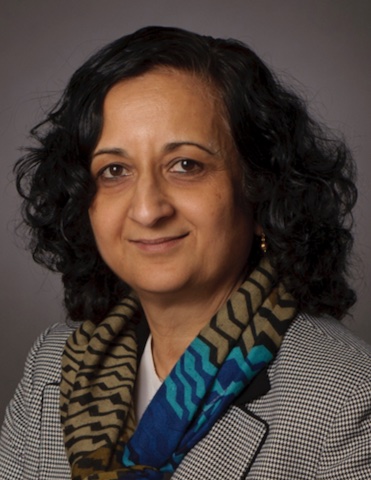Fall ’23 CSC@USC/CommNetS-MHI Seminar Series
 |
Anuradha Annaswamy,
Massachusetts Institute of Technology
|
Abstract
The power grid has evolved from a physical system to a cyber-physical system that consists of digital devices that perform measurement, control, communication, computation, and actuation. With increased penetration in distributed energy resources (DER) that include renewable generation, flexible loads, and storage, these devices can be as large as 8 billion in number just in the US grid, many of whom are capable of monitoring and making crucial decisions. While these devices provide extraordinary opportunities for improvements in efficiency and sustainability, they also can introduce new vulnerabilities in the form of cyberattacks. This in turn can cause significant challenges in ensuring grid resilience, i.e. satisfactory restoration of grid services in the face of severe anomalous behavior. The additional difficulty is to ensure this property even while integrating DERs which are intermittent, uncertain, and distributed. In order to overcome these challenges, a framework that enables distributed decision-making and control is essential, and forms the focus of this talk. With growing presence of DER, owners and stakeholders also increase in number. In order to leverage disparate ownerships, it is critical to design market structures that enable smooth integration of DERs. Local electricity markets with a hierarchical structure have been proposed that accommodate the distributed ownership of DERs, both in location and time, improve market performance, and at the same time ensure that physical constraints due to power physics are not violated. Such a market structure also enables visibility to grid operators, which can be utilized not only for market performance but also for grid resilience. This talk will explore the relation between market mechanisms, distributed optimization, and resilience for the grid. A variety of attack surfaces including those that compromise large IoT (internet-of-things) networks will be considered. The use of distributed visibility and the related situational awareness to the operators will be examined through simulation studies of a distribution grid with 100,000 nodes. The role of distributed decision-making principles of optimization and control in prevention, resilience, and detection & isolation will be examined.
Biosketch
Dr. Anuradha Annaswamy is Founder and Director of the Active-Adaptive Control Laboratory in the Department of Mech. Eng. at MIT. Her research interests span adaptive control theory and its applications to several engineering systems including to aerospace, automotive, propulsion, and energy systems, cyber-enabled energy grids, and urban mobility. She has received best paper awards (Axelby; CSM), Distinguished Member and Distinguished Lecturer awards from the IEEE Control Systems Society (CSS), Best Paper award from IFAC for Annual Reviews in Control (2021-23), and a Presidential Young Investigator award from NSF. She is a Fellow of IEEE and IFAC. She is the recipient of the Distinguished Alumni award from Indian Institute of Science for 2021.
Anu Annaswamy is the author of a graduate textbook on adaptive control and several journal and conference publications, and co-editor of two vision documents on smart grids, two editions of the Impact of Control Technology report, and the 2023 CSS report “Control for Societal-scale Challenges: Road Map 2030”. She is also a coauthor of a 2021 National Academy of Sciences, Engineering, and Medicine (NASEM) Committee report on the Future of Electric Power in the United States, and a 2023 NASEM report on the Role of Net-metering in the Evolving Electricity System. She served as the President of CSS in 2020. She is a Faculty Lead in the Electric Power Systems workstream in the MIT Future Energy Systems Center.
Acknowledgement: seminar series is supported by the Ming Hsieh Institute and Quanser.
